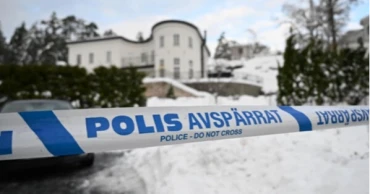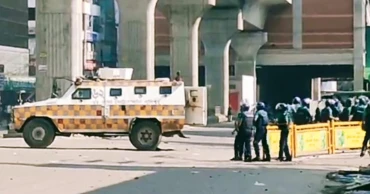Clashes
Cricket fans clash in Mirpur for BPL tickets
Hundreds of fans clashed in front of the Sher-e-Bangla National Cricket Stadium on Monday, the opening day of the Bangladesh Premier League (BPL), because they could not buy tickets at the designated branches of a private bank.
Historically, BCB struggled to ensure a smoother flow of BPL tickets in the past. They failed to do so once again.
Police had to use batons to disperse the crowd of fans who broke the main gate of the stadium, and they also reportedly barred the car of a national team cricketer. But it is not clear if the cricketer was inside the car during the incident.
India reeling at 33-3 at lunch on Day 5, chasing 340 to win 4th Test against Australia
Yesterday, fans demonstrated for tickets too when the board did not provide official information about ticket sales. The BCB issued a press release only in the afternoon detailing where and how fans could purchase tickets.
This year, fans can buy tickets from online platforms and seven branches of a private bank. But, as fans said, they were not able to get tickets from the Mirpur branches, which angered them.
For online buyers, tickets can be accessed through the official website (www.gobcbticket.com.bd).
Hard copies of tickets are being sold at designated Modhumoti Bank PLC branches. On Sunday, tickets were made available between 4:00 PM and 6:00 PM. On Monday, the opening day of BPL, sales will continue from 10:00 AM to 4:00 PM.
Bumrah stars with four wickets but Australia's tail pushes lead past 300 on 4th day of 4th test
The branches facilitating sales include those located in Mirpur, Motijheel, Uttara, Gulshan, Dhanmondi, Kamrangirchar, and on VIP Road in Paltan. Fans are advised to visit the branch closest to them during the specified hours.
In the opening match of the event, the defending champions Fortune Barishal is taking on newcomer Durbar Rajshahi.
1 year ago
Demra student clashes leave 50 injured; Kabi Nazrul College shut indefinitely
At least 50 people, including students, were injured in sporadic clashes among the students of three colleges involving Kabi Nazrul College, Suhrawardy College and Dr Mahbubur Rahman Molla College in Dhaka’s Demra area on Monday.
Meanwhile, Kabi Nazrul College was declared closed for an indefinite period following the mayhem, according to an announcement made in a noticeboard of the college.
Earlier in the day, a clash erupted at Dr Mahbubur Rahman Molla College in Demra as the students of Kabi Nazrul College and Suhrawardy College carried out vandalism at the college over Sunday’s clash.
Students started gathering near Dr Mahbubur Rahman Molla College in the morning and carried out vandalism around 12 noon. They also looted valuables from the college.
Around 1 pm, the students of Dr Mahbubur Rahman Molla College appeared there and a chase and counter chase took place among them.
Later, they attacked each other, leaving 50 people injured. The whole area turned into a battlefield following the clash.
The injured were taken to different hospitals.
Among them, 30 were taken to Dhaka Medical College and Hospital, said in-charge of the hospital police camp, Mohammad Faruk.
On information, police rushed to the spot and brought the situation under control.
Besides, six platoons of Border Guard Bangladesh (BGB) have been deployed in Jatrabari-Demra area on Monday following clash.
According to a media release of Dhaka Metropolitan Police (DMP), additional police have been deployed from Sutrapur to Demra area from 7 am following Sunday’s clash.
Police tried to control the situation peacefully, fearing it might take a different turn. Despite this, the agitating students engaged in chase and counter chase, attack and looting, it said.
At least 25 students were injured in the series of clashes in the area, said the release.
Meanwhile, rumours are being spread on social media claiming that two individuals died in the incident, which is completely false. DMP has urged everyone to refrain from such misinformation, it said.
On Sunday, students from 35 colleges near National Medical College Hospital vandalised Dhaka National Medical College and Hospital at Bakshibazar in Old Dhaka centering a student’s death in ‘wrong treatment’ at the hospital.
6 BGB platoons deployed in Jatrabari-Demra after student clashes
On November 16, Abhijit Halder, an HSC student of Demra’s Dr Mahbubur Rahman Molla College, was admitted to the medicine department of the hospital with dengue. He died on November 18.
After that students vandalised the hospital alleging negligence in treatment at the hospital on Sunday.
They alleged that students from Kabi Nazrul and Suhrawardy Colleges supported by National Medical College attacked them.
Later, students from 35 colleges clashed with the students of Kabi Nazrul and Suhrawardy Colleges and vandlised property of the two colleges on Sunday, leaving at least 20 people injured.
The 35 colleges included Dr. Mahbubur Rahman Molla College, Dhaka College, Dhaka Ideal College, City College, Giyasuddin College, Government Tolaram College, Imperial College, Borhanuddin College, Science College, Dhaniya College, Lalbagh Government College, Udayan College, Adamjee, Notre Dame, Rajarbagh College, Nur Mohammad, Munshi Abdur Rouf College, Siddheswari College, Green Line Polytechnic, Dhaka Polytechnic, Mahbubur Rahman Institute of Science and Technology, and others from the capital.
However, Kabi Nazrul College's unit general secretary of Jatiyatabadi Chhatra Dal Kawser Hossain denied any involvement in the incident. "We are students, and we support students. We did not attack anyone," he said.
Regarding the vandalism, Suhrawardy College Islamic Studies department teacher Tariqul Islam said, "I sent them back first, but they returned with a group. They stole many computers and destroyed them, even took rifles from the NCC.
They vandalised all 17 departments and even damaged four motorcycles owned by a teacher."
Suhrawardy College Vice-Principal Dr Farida Yasmin said, "We were assured by the principal that nothing would happen, but the attack occurred. The entire college was attacked, and even my room was ransacked."
1 year ago
Clashes erupt in Sweden's third largest city after another Quran burning and at least 3 are detained
Clashes erupted in an immigrant neighborhood in Sweden’s third largest city after an anti-Muslim protester set fire to the Quran, police said Monday.
Police in Malmo said they were pelted with rocks and dozens of cars were set on fire, including in an underground garage, describing the events that started Sunday and lasted overnight as “a violent riot.”
The clashes started after an anti-Islam activist Salwan Momika on Sunday burned a copy of the Quran and an angry mob tried to stop him while police, some of them helmeted, detained several people. At least three people have been detained, police said.
Read: Israel's PM pitches fiber optic cable idea to link Asia and the Middle East to Europe
Early Monday, an angry crowd of mainly young people also set fire to tires and debris and some were seen throwing electric scooters, bicycles and barriers in Malmo's Rosengard neighborhood, which has seen similar clashes in the past. There were several banners relating to the Quran burning.
“I understand that a public gathering like this arouses strong emotions, but we cannot tolerate disturbances and violent expressions like those we saw on Sunday afternoon," senior police officer Petra Stenkula said.
Read: Putin profits off US and European reliance on Russian nuclear fuel
“It is extremely regrettable to once again see violence and vandalism at Rosengard,” she said.
In the past months, Momika, a refugee from Iraq, has desecrated the Quran in a series of anti-Islam protests mostly in Stockholm that have caused anger in many Muslim countries. Swedish police have allowed his actions, citing freedom of speech.
The Quran burnings have sparked angry protests in Muslim countries, attacks on Swedish diplomatic missions and threats from Islamic extremists. Muslim leaders in Sweden have called on the government to find ways to stop the Quran burnings.
Read: Thousands of Muslims take to the streets to express outrage over Quran desecration in Sweden
Sweden dropped its last blasphemy laws in the 1970s and the government has said it has no intention to reintroduce them.
However, the government has announced an inquiry into legal possibilities for enabling police to reject permits for demonstrations over national security concerns.
2 years ago
In Pakistan clashes, Khan showed he commands huge crowds. What's driving them?
The arrest of former Pakistani Prime Minister Imran Khan earlier this week has shown how quickly his fervent loyalists can mobilize in large numbers.
Within hours of his detention, his supporters torched vehicles and buildings, and attacked police and military facilities to express their fury over the treatment of the 70-year-old opposition leader. Khan’s supporters have emerged as a major force, challenging the authority of the government and military, aware that they can shift the political balance through unrelenting pressure.
Although Khan has since been released from detention, it's clear his supporters are ready to stay on the streets. Here's a look at who they are and what's driving them:
Also Read: Pakistan government supporters to stage rare sit-in, protest release of former Premier Imran Khan
WHAT IS IMRAN KHAN'S APPEAL?
Khan has been a star in Pakistan for decades. As an athlete, in 1992 he led the country to its only World Cup victory in cricket, a massive sport in South Asia. That made him a hero to tens of millions of people before he even entered politics.
He founded Pakistan’s first cancer hospital, named after his mother, and ventured into philanthropy. His anti-corruption mantra is a hit in a country riddled with graft. And he has claimed he is the only leader who can stand up to the West and, in particular, the United States. It's a popular narrative in Pakistan, where resentment of foreign involvement in domestic matters is deep-seated.
Also Read: Pakistani court frees former Prime Minister Imran Khan
WHO ARE HIS SUPPORTERS?
Khan's appeal spans social classes. Loyalists include young educated Pakistanis without links to the two main political dynasties, the Sharifs and the Bhuttos. He also appeals to the diaspora and illiterate people in rural areas who have no access to social media or the internet.
Unifying these groups is Khan's message about challenging the elites and the status quo. He feeds his supporters' sense of disenfranchisement. Men, women, young and old travel by the thousands to hear him speak at open-air rallies.
His support among people in their 20s and 30s explains his party's dominance of social media, especially Twitter. Most of his powerbase lies in the eastern Punjab province and the northwestern province of Khyber Pakhtunkhwa.
HOW IS THIS OUTBREAK OF VIOLENCE DIFFERENT?
Neither this week's violent clashes with law enforcement nor the mass arrest of activists and leaders from Khan’s Pakistan Tehreek-e-Insaf party have deterred his followers. They say they will not allow harm to be done to Khan, and swear to take revenge against anyone daring to cross what they call their red line, in this case his arrest.
Also Read: Pakistan deploys troops to halt unrest after ex-Prime Minister Khan is ordered held on new charges
This level of violence hasn’t been seen since 2007, when then-Prime Minister Benazir Bhutto was assassinated and her followers rampaged for days. The suspension of social media and mobile internet hasn't stopped Khan's supporters from turning out in the thousands.
WHAT HAPPENS NEXT?
The turmoil this week has placed the government, security forces and judiciary in a tough position.
While Khan's supporters haven't brought Pakistan to a standstill, they have disrupted daily life. Educational institutions have shuttered temporarily, consumer spending has fallen as people stay home, industry has slowed, daily governance has ground to a halt, while the suspension of mobile internet has impacted services like food delivery and ride-hailing apps.
Also Read: Pakistan on edge as court decides whether ex-PM Imran Khan goes free or is rearrested
Khan's arrest and what critics view as the government’s fixation on him have only stoked the passions of his loyalists, who say they are prepared to do anything to save him.
2 years ago
At least 100 killed in armed fighter clashes: Sudan doctors
At least 100 people were killed in clashes that erupted last month between armed fighters in a city in Sudan’s restive region of Darfur, according to the Sudan’s Doctors Syndicate.
Hospitals were still out of service in the Darfur city of Genena and an accurate count of the wounded was still hard to make, the doctors’ union added in a statement posted on their official Facebook page late Sunday.
The fighting in Genena, which broke out a few days after Sudan’s two rival generals took arms against each other in Khartoum, pointed to the possibility that conflict in the capital could spiral to other parts of the East African country.
Also Read: Sudan conflict: 136 Bangladeshi evacuees arrive in Dhaka
At least 481 civilians were killed in Khartoum clashes that erupted in mid-April between the military, led by Gen. Abdel Fattah Burhan, and the paramilitary Rapid Support Forces, led by Gen. Mohamed Hamdan Dagalo, according to the same doctors’ statement. The number of the wounded among civilians has jumped to more than 2560.
2 years ago
More clashes in Pakistan as police try to arrest Imran Khan
Supporters of former Pakistani Prime Minister Imran Khan threw bricks at police who fought back with clubs and tear gas for a second day Wednesday after officers tried to arrest the ousted premier for failing to appear in court on graft charges.
Police besieged the 70-year-old opposition leader’s house in the eastern city of Lahore since Tuesday as his supporters hurled rocks and bricks, and swung batons snatched from the officers.
Violence was also reported between Khan's supporters and police in other major cities, including Karachi, Islamabad, the garrison city of Rawalpindi, Peshawar, Quetta and elsewhere in Pakistan. The government sent additional police to Lahore's upscale area of Zaman Park, where Khan lives.
Also Read: Clashes erupt in Pakistan as police try to arrest Imran Khan
Early Wednesday, Khan had emerged from his house to meet with his supporters, who had faced tear gas and police batons through the night to save him from arrest. He said he was ready to travel to Islamabad on March 18 under his arrest warrant, but that police did not accept the offer.
Khan later posed for cameras seated at a long table, showing off piles of spent tear gas shells he said had been collected from around his home.
“What crime did I commit that my house has been attacked like this,” he tweeted. Fawad Chaudhry, a senior party leader from Khan’s party claimed hundreds of Khan’s supporters were injured.
At the Islamabad High Court, Khan's lawyer Khawaja Haris and his team petitioned for the suspension of the arrest warrant for the former premier. The court was expected to issue a ruling about the suspension later Wednesday.
By around 2 p.m., the clashes subsided and police stepped back, apparently in an effort to ease the tensions. This encouraged more Khan supporters to join those outside and inside his home as the situation calmed.
Many chanted Allahu akbar, the Arabic phrase for “God is great.” Khan, still wearing a gas mask, greeted them at his home.
Officials said security forces were told to move back from Khan’s house while the court in the capital, Islamabad, considered whether to suspend the warrant.
The Punjab provincial government said Wednesday that more than 100 police officers were injured in clashes with Khan’s supporters. They denied Khan's allegation that officers were using live ammunition.
Khan, who was ousted in a no-confidence vote in Parliament in April, was ordered to appear before a judge in Islamabad on Friday to answer charges of illegally selling state gifts he had received during his term as premier and concealing his assets.
The former premier has avoided appearances before the court since November, when he was wounded in a gun attack at a protest rally in eastern Punjab province, claiming he was not medically fit to travel from Lahore to Islamabad to face indictment.
Last week, he went to Islamabad to appear before three courts, but he failed to appear before the fourth court to face indictment in the graft case, which is a legal process for starting his trial.
Khan has claimed that the string of cases against him, which includes terrorism charges, are a plot by the government of his successor, Prime Minister Shahbaz Sharif, to discredit the former cricket star turned Islamist politician.
From his home, Khan urged his followers on Tuesday to fight on even if he is arrested. “They think this nation will fall asleep when Imran Khan is jailed,” he wrote on Twitter. “You need to prove them wrong.”
On Wednesday, he tweeted that there was a plot “to abduct & assassinate” him.
Prime Minister Sharif on Wednesday criticized Khan in televised remarks, saying that the ex-premier “considers himself above the law, and he has been defying court orders to avoid arrest.” Sharif insisted he had nothing to do with the arrest warrant, which he said was a court order and the police were only complying with it.
In Pakistan’s turbulent political history, at least seven former prime minister have been arrested in various cases and tried by courts since this South Asian country was created in 1947 after gaining independence from British colonial rule.
Former Prime Minister Zulfikar Ali Bhutto was hanged by the military government in 1979 after his ouster in a coup. His daughter, Benazir Bhutto, served twice as prime minister and was assassinated during an election rally in 2007 in the garrison city of Rawalpindi.
Nawaz Sharif, Pakistan’s longest-serving premier and the brother of current prime minister, was in office from 1990 to 1993 and from 1997 to 1999, when was ousted in a military coup by Gen. Pervez Musharraf. He returned as premier in 2013 but was ousted by the country’s Supreme Court in 2017. He was later arrested, tried and convicted in a corruption case, although he has always denied the charges and today lives in exile in Britain.
2 years ago
Clashes erupt in Pakistan as police try to arrest Imran Khan
Clashes between Pakistan's police and supporters of former Prime Minister Imran Khan persisted outside his home in the eastern city of Lahore on Wednesday, a day after officers went to arrest him for failing to appear in court on graft charges.
The police operation triggered clashes between Khan's supporters and police in the country's major cities, including Karachi, Islamabad, the garrison city of Rawalpindi, Peshawar, Quetta and elsewhere in Pakistan.
For the past 18 hours, police were firing tear gas at the house as the 70-year-old opposition leader's supporters hurled rocks and bricks at the officers. The upscale area of Zaman Park where Khan lives was under siege since Tuesday. The government was sending additional police to tackle the situation after hundreds of Khan's supporters showed unexpected perseverance.
Early Wednesday, Khan emerged from his house to meet with his supporters, who faced tear gas and police batons the whole night to save him from arrest. He said he was ready to travel to Islamabad on March 18 under his arrest warrant, but police did not accept the offer.
The confrontation outside Khan's house continued.
Also Read: Pakistan's ex-PM Imran Khan no-show in court, avoids arrest
About a dozen police and some 35 of Khan's supporters were reported injured. Tear gas shells and pieces of bricks littered the pavement as Khan's followers fought back with batons they had brought to resist police, who were preparing for a final effort to arrest Khan.
Khan, who was ousted in a no-confidence vote in Parliament in April, was ordered to appear before a judge in Islamabad on Friday to answer charges of illegally selling state gifts he had received during his term as premier and concealing his assets.
The former premier has avoided appearances before the court since November, when he was wounded in a gun attack at a protest rally in the eastern Punjab province, claiming he was not medically fit to travel from Lahore to Islamabad to face indictment.
Also Read: Pakistani court orders arrest of former premier Imran Khan
Last week, he went to Islamabad to appear before three courts, but he failed to appear before the fourth court to face indictment in the graft case, which is a legal process for starting his trial.
Khan has claimed that the string of cases against him, which includes terrorism charges, are a plot by the government of his successor, Prime Minister Shahbaz Sharif, to discredit the former cricket star turned Islamist politician.
On Tuesday, Sharif told Pakistan's Geo television that Khan's arrest was ordered by a court, and it was not political victimization.
“We will arrest him, and will do it on a court order,” Shahzad Bukhari, deputy-inspector general of Islamabad police, told reporters earlier in Lahore. Later, Bukhari was also lightly injured in the violence and received first aid from police medics at the scene.
Also Read: Imran Khan's party dissolves assembly in Pakistani province
However, Shah Mahmood Qureshi, a top leader from Khan’s Pakistan Tehreek-e-Insaf party, said the government was trying to disrupt law and order by sending police to Khan’s house.
“We are ready to find a middle way through talks with police, but we should know what the purpose of today’s police raid is,” he said. “Don't worsen the situation. Let us sit and discuss what you want,” Qureshi asked the police.
He said Khan could consider voluntarily offering his arrest, “but let us talk first."
Also Read: Imran Khan far better actor than Shahrukh and Salman, says Pakistani politician
Fawad Chaudhry, another senior party leader, said Khan’s legal team was in the process of submitting a request to the Islamabad High Court to have warrants against Khan suspended. Khan's lawyers were also legally challenging the warrants before another Islamabad court Tuesday.
From inside his home, Khan urged his followers to fight on even if he is arrested. “They think this nation will fall asleep when Imran Khan is jailed,” he wrote on Twitter. “You need to prove them wrong.”
Police said reinforcements were on their way to Khan's house to bring the situation under control.
TV footage showed tear gas shells falling inside Khan's house.
Angered over the expected arrest of Khan, his supporters took to the streets across Pakistan, blocking some key roads near Islamabad while asking the government to refrain from arresting Khan.
“We will arrest this man on the court order and he ran away to avoid arrest,” said Interior Minister Rana Sanaullah Khan, who is not related to the former premier. He said Khan will be produced before the court.
2 years ago
Over 100 injured in AL-BNP clash in Mirpur
At least 100 BNP activists were injured during a series of clashes with ruling Awami League rivals onThursday at capital’s Mirpur area over holding a scheduled rally, said the opposition party.
“We took permission from police to hold the rally and accordingly asked our activists to join. As our leaders, activists were coming with a procession, activists of AL, Jubo League, and Bangladesh Chaatra League (BCL) attacked them with sticks, rods,” said Aminul Haque, member secretary of Dhaka North unit of BNP.
Police also lobbed tear shells at BNP activists, he said. “At least 100 of our activists were injured and 15 were held by police,” said the BNP leader.
Such an attack on a protest rally against price hikes of essentials proves that the government wants to prevent democratic rights in a fascist style, said Aminul.
Sheikh Bazlur Rahman, president of Dhaka metropolitan north Awami League said a party rally was scheduled there. But BNP also announced a rally later at the same place.
He said AL activists were directed to avoid confrontation considering the rallies called by the parties at the same place and same time, “But some overexcited people got involved in a clash,”.
The trouble started around 2pm as the ruling party activists reportedly barred their BNP rivals from going to their scheduled rally venue in Mukul Fouz field at Mirpur Section No-6, according to witnesses..
Read: AL-BNP clash leaves 20 injured in Feni
Witnesses said the clash occurred around the Mukul Fouz field as the BNP activists tried to resist the ruling party rivals.
At one stage, police rushed to the spot and lobbed teargas shells to bring the situation under control.
However, sporadic clashes continued at different lanes in the area till 3:15pm.
Iqbal Hossain, former joint general secretary of Dhaka north city unit of BNP said the ruling party activists vandalised their makeshift stage of the rally and took a position in the venue in a bid to foil the programme.
Officer-in-Charge of Pallabi police station, Parvez said the agitation started after activists of both the parties were moving toward the rally spot.
“The situation is under control now and the BNP activist could not hold a rally after the clash. They left the spot,” said OC Parvez.
Contacted, Additional Deputy Commissioner (ADC) of Pallabi Zone Arif Hossain said that clashes took place centering the BNP's rally. He, however, denied the attack on the rally by the ruling party activists. “ What they (BNP men) are telling is absolutely false”, he said.
Several police members were injured when they tried to disperse the agitators. At one point, when the BNP activists attacked the police, they first fired teargas shells.
Then several rounds of rubber bullets were fired to deal with the situation, the ADC (Pallabi Zone) added.
Earlier on September 10, BNP announced to hold public rallies in 16 spots under its Dhaka south and north city units until September 27 in protest against the increase in prices of essentials, fuel and transport fares.
The rallies are also meant for registering the party’s protest against the killings of Bhola Chhatra Dal leader Noor-e-Alam, Swechchasebak Dal leader Abdur Rahim and Narayanganj Jubo Dal leader Shaon Prodhan.
The party has so far held four rallies.
END/UNB/ARJ-FA/F
3 years ago
BNP’s 44th founding anniversary observed amid clashes with cops
BNP and its associate bodies celebrated the 44th founding anniversary of the party across the country on Thursday amid sporadic clashes with police in different districts, leaving a Jubo Dal worker killed and many others injured.
BNP and all other units of the party across the country also marked the day by holding various programmes, including rallies and processions.
BNP leaders alleged that their peaceful programmes marking the founding anniversary were attacked by police and ruling party activists in different districts.
Read: BNP vows to avenge blood of its slain workers by ousting the govt
Shaon, 21, an activist of Jubo Dal, BNP's youth wing, was killed and at least 50 people were injured in a clash between police and the opposition party members in Narayanganj. The clash ensued as police obstructed a procession of the party.
Similar clashes broke out between the party activists and police in Netrakona, Sirajganj and Manikganj as BNP held political programmes to celebrate the founding anniversary.
On September 1, 1978, late President Ziaur Rahman founded the party with a 19-point programme to build a self-reliant Bangladesh.
The party flag was hoisted atop its Nayapaltan central office and all other offices of BNP across the country at 6am.
BNP secretary general Mirza Fakhrul Islam Alamgir together with party senior leaders placed wreaths and offered fateha at the grave of its founder Ziaur Rahman at 12pm, marking the day.
They also joined a special prayer (munajat) seeking the salvation of Zia’s departed soul and the good health of party Chairperson Khaleda Zia.
BNP Standing Committee members Khandaker Mosharraf Hossain, Mirza Abbas, Gayeshwar Chandra Roy, Nazrul Islam Khan, Amir Khosru Mahmud Chowdhur and Iqbal Hasan Mahmud Tuku, were, among others, present.
The party brought out the rally from its central office in the afternoon, marking its 44th founding anniversary. Thousands of leaders and activists of the party and its associate bodies holding banners, festoons and photos of the party's top leaders joined the rally.
BNP will also arrange a discussion on Friday in observance of its founding anniversary.
3 years ago
Clashes erupt after Iraqi Shiite cleric resigns, 15 dead
An influential Shiite cleric announced Monday that he would resign from Iraqi politics, prompting hundreds of his angry followers to storm the government palace and sparking clashes with security forces. At least 15 protesters were killed.
Protesters loyal to cleric Muqtada al-Sadr pulled down the cement barriers outside the government palace with ropes and breached the palace gates. Many rushed into the lavish salons and marbled halls of the palace, a key meeting place for Iraqi heads of state and foreign dignitaries.
Iraq’s military announced a nationwide curfew, and the caretaker premier suspended Cabinet sessions in response to the violence. Medical officials said dozens of protesters were wounded by gunfire and tear gas and physical altercations with riot police.
Also read: Officials: Landslide at Shiite shrine in Iraq kills 7
As night fell, Saraya Salam, a militia aligned with al-Sadr clashed with the Popular Mobilization Forces security group. A small force from the special forces division and Iraqi Army's 9th Division also joined to contain the militants as the clashes continued for hours inside the Green Zone, the seat of Iraq's government.
At least one soldier from the special forces division, which is responsible for security in the Green Zone, was killed. Many others, including a civilian woman, were wounded, two security officials said. Several mortar rounds were heard.
The crackle of machine gun fire echoed throughout central Baghdad.
The PMF is an umbrella group composed of state-sanctioned paramilitary groups, the most powerful of which are aligned with al-Sadr's rivals in the Iran-backed political camp.
Also read: IS claims Pakistan bombing that kills 56 at Shiite mosque
Security officials said mortars and rocket-propelled grenades were used in the clashes, a culmination of intractable political impasse between the rival camps.
Iraq’s government has been deadlocked since al-Sadr’s party won the largest share of seats in October parliamentary elections but not enough to secure a majority government. His refusal to negotiate with his Iran-backed Shiite rivals and subsequent exit from the talks has catapulted the country into political uncertainty and volatility amid intensifying intra-Shiite wrangling.
Iraq's majority Muslim population is split into two sects, Shiites and Sunnis. Under Saddam Hussein, the Shiites were oppressed until the U.S.-led invasion reversed the political order. Now the Shiites are fighting among themselves, with the dispute centering around power and state resources but also influence over the Shiite street.
To further his political interests, al-Sadr has wrapped his rhetoric with a nationalist and reform agenda that resonates powerfully among his broad grassroots base of supporters who hail from Iraq’s poorest sectors of society and have historically been shut out from the political system.
Many were first followers of his father, a revered figure in Shiite Islam. They are calling for the dissolution of parliament and early elections without the participation of Iran-backed Shiite groups, which they see as responsible for the status quo.
During Monday's clashes, Saraya Salam, a militia aligned with al-Sadr gathered in the capital’s Tahrir Square to “protect” protesters, one of its commanders said.
A senior medical official confirmed at least 15 protesters were killed by gunfire.
Iraq’s caretaker premier said he would open an investigation into the shootings and said the use of live ammunition against protesters was forbidden.
Protests also broke out in the Shiite-majority southern provinces, with al-Sadr’s supporters burning tires and blocking roads in the oil-rich province of Basra and hundreds demonstrating outside the governorate building in Missan.
Iran considers intra-Shiite disharmony as a threat to its influence in Iraq and has repeatedly attempted to broker dialogue with al-Sadr.
In July, Al-Sadr's supporters broke into the parliament to deter his rivals in the Coordination Framework, an alliance of mostly Iran-aligned Shiite parties, from forming a government. Hundreds have been staging a sit-in outside the building for over four weeks. His bloc has also resigned from parliament. The Framework is led by al-Sadr's chief nemesis, former Prime Minister Nouri al-Maliki.
This is not the first time al-Sadr, who has called for early elections and the dissolution of parliament, has announced his retirement from politics — and many dismissed Monday's move as another bluff to gain greater leverage against his rivals amid a worsening stalemate. The cleric has used the tactic on previous occasions when political developments did not go his way.
But many are concerned that it's a risky gambit and are worried how it will affect Iraq’s fragile political climate. By stepping out of the political process, al-Sadr is giving his followers, most disenfranchised from the political system, the green light to act as they see fit.
Al-Sadr also commands a militia and maintains a great degree of influence within Iraq's state institutions through the appointments of key civil servant positions. His Iran-backed rivals also have militia groups.
Iraq’s military swiftly called on the cleric's supporters to withdraw immediately from the heavily fortified government zone and to practice self-restraint “to prevent clashes or the spilling of Iraqi blood,” according to a statement.
“The security forces affirm their responsibility to protect government institutions, international missions, public and private properties,” the statement said.
Iraq's caretaker Prime Minister Mustafa al-Kadhimi also demanded that al-Sadr call on his followers to withdraw from government institutions.
The U.N. mission in Iraq said Monday’s protests were an “extremely dangerous escalation” and called on demonstrators to vacate all government buildings to allow the caretaker government to continue running the state.
It urged all to remain peaceful and “refrain from acts that could lead to an unstoppable chain of events.”
“The very survival of the state is at stake,” the statement said.
Al-Sadr announced his withdrawal from politics in a tweet, and ordered the closure of his party offices. Religious and cultural institutions will remain open, it said.
The true motivations behind al-Sadr’s announcement appeared to be a reaction to the retirement of Shiite spiritual leader Ayatollah Kadhim al-Haeri, who counts many of al-Sadr’s supporters as followers.
In a surprise announcement Sunday, al-Haeri said he would be stepping down as a religious authority for health reasons and called on his followers to throw their allegiance behind Iran’s Ayatollah Ali Khamenei, rather than the Shiite spiritual center in Iraq's holy city of Najaf.
The move was a blow to al-Sadr, who despite harboring ambitions to be a religious authority lacks the scholarly credentials to be an ayatollah. Al-Haeri, who resides in the Iranian holy city of Qom, once provided him with the legitimacy he lacked by designating al-Sadr as his representative in Iraq. He cut ties shortly after with the cleric, but continued to enjoy the support of his followers.
By calling on his followers to side with Khamenei, al-Haeri brought on a crisis of legitimacy for al-Sadr.
In his tweet, al-Sadr said al-Haeri's stepping down “was not out of his own volition.”
3 years ago

















